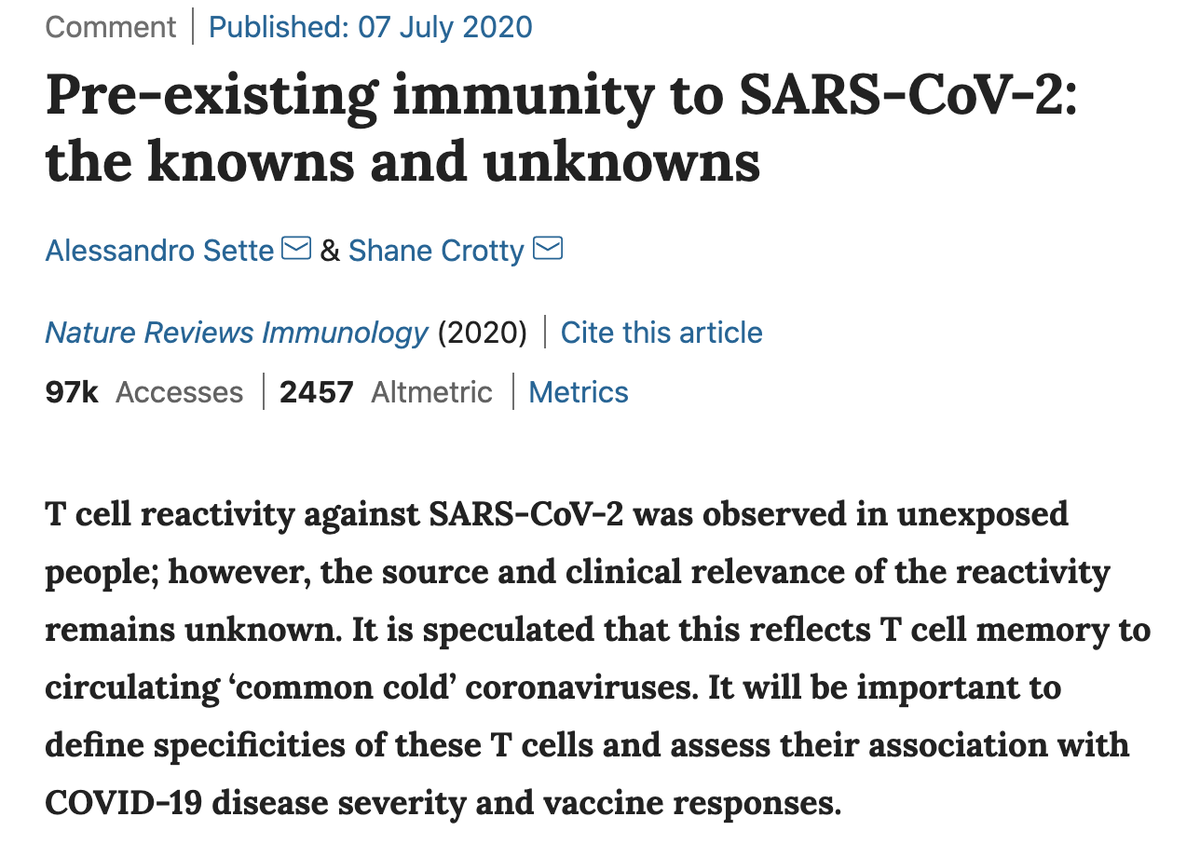I do forecasting, not epidemiology. But what do you do when all forecasting relies on epidemiology? Well, you have to get on with it.
SOME OBSERVATIONS: t-cells may be relevant to the global economy...
SOME OBSERVATIONS: t-cells may be relevant to the global economy...
For months, we have been getting results of various serology studies, and most them show a relatively low degree of SARS-COV-2 antibodies.
Here is a selection of the ones which seem to have & #39;near random sampling& #39; (although not sure why Bergamo is so wild).
Here is a selection of the ones which seem to have & #39;near random sampling& #39; (although not sure why Bergamo is so wild).
The key point is that really no city has much more than 20% of the population with SARS-COV-2 antibodies.
And that is generally viewed as far below what is needed for so-called herd-immunity (even if the thresholds could be pushed down by & #39;structural social distancing& #39;).
And that is generally viewed as far below what is needed for so-called herd-immunity (even if the thresholds could be pushed down by & #39;structural social distancing& #39;).
BUT. What if there are other types of immunity, beyond the specific antibodies the serology studies are meant to detect?
(via US CDC)
(via US CDC)
There have been a number of academic studies (although some not peer reviewed yet) suggesting significant pre-existing immunity (summary of some here)
https://www.nature.com/articles/s41577-020-0389-z?e=39223">https://www.nature.com/articles/...
https://www.nature.com/articles/s41577-020-0389-z?e=39223">https://www.nature.com/articles/...
There have not been much talk about this on econtwitter/fintweet, but the epidemiology crowd does seem to be getting excited.
https://twitter.com/VincentRK/status/1284855259731558402
https://twitter.com/VincentRK... href=" https://twitter.com/PSampathkumarMD/status/1280875999547269122">https://twitter.com/PSampathk... https://twitter.com/EricTopol/status/1283390434836795393">https://twitter.com/EricTopol...
https://twitter.com/VincentRK/status/1284855259731558402
It could possibly make a huge difference.
- If immunity is just in the 5-20% range, as suggested by standard serology testing, then we can have big 2nd and 3rd wave outbreaks.
- if the immunity is much larger (when adding T-cell reactivity) perhaps those risks are different
- If immunity is just in the 5-20% range, as suggested by standard serology testing, then we can have big 2nd and 3rd wave outbreaks.
- if the immunity is much larger (when adding T-cell reactivity) perhaps those risks are different
This will make a huge difference for for the global economy whether we get big 2nd and 3rd round outbreaks or not in H2 2020 and into 2021.
We do not how & #39;powerful& #39; this non-specific T-cell immunity is. But if it is powerful, and if 20-50% of the population has it, it means that we could be much closer to herd immunity in places with large outbreaks already.
Nobody knows about this for sure. But forecasting is about probabilities. We have to put some probability that this will impact COVID and economic trajectories from here.
It would seem especially relevant for regions where direct antibodies are also elevated (think NYC, Delhi, Sao Paolo), such that the & #39;combined immunity& #39; is quite significant (with the usual caveats of how long that immunity will last).
I will leave it at that. T-cells could have a major influence on the global economic trajectory in coming quarters (not the variable most econ-models focus on!). It is not a given, but something to think about probabilistically. 2020 is a different year. END.

 Read on Twitter
Read on Twitter




